In the competitive automotive landscape, the struggle between sporty performance and practicality often leads consumers to make tough choices. This time, we delve into a battle between two prominent SUVs: the CUPRA Terramar and the Skoda Karoq. Both vehicles offer unique blends of technology, performance, and comfort, but which one stands out in the 2024 model year? Let's break it down.
CUPRA Terramar vs Skoda Karoq - Differences and prices compared
Compare performance (272 HP vs 190 HP), boot space and price (36900 £ vs 29100 £ ) at a glance. Find out which car is the better choice for you – CUPRA Terramar or Skoda Karoq?
Performance Comparison
The CUPRA Terramar is available with an impressive lineup of engines, including options for Plug-In Hybrid, Petrol MHEV, and traditional petrol engines. The power figures range from 150 HP to a hefty 272 HP, ensuring it can cater to various driving styles. The Terramar excels in acceleration, with the fastest variant achieving 0-100 km/h in just 5.3 seconds. Furthermore, its torque capably supports powerful driving, with up to 400 Nm on offer.
On the other hand, the Skoda Karoq, while slightly less sporty, provides a versatile range of engine options. With power outputs from 115 to a commendable 190 HP, it focuses more on fuel efficiency than outright speed. The quickest Karoq do the 0-100 km/h sprint in 7 seconds but generally sits between 8.7 to 10.6 seconds depending on the configuration. Its torque peaks at 360 Nm, indicating sufficient power for daily driving needs.
Efficiency and Sustainability
With increasing focus on sustainability, the CUPRA Terramar shines with its Plug-In Hybrid variant, offering a fuel consumption rate as low as 0.4 L/100km and an electric range of 120 km, making it an attractive option for eco-conscious drivers. The CO2 emissions also reflect its efficiency, with some models emitting a mere 10 g/km.
The Skoda Karoq, although not hybrid, offers commendable fuel consumption figures ranging from 4.9 to 6.1 L/100km, depending on the engine choice. CO2 emissions for the Karoq are slightly higher, ranging from 129 to 174 g/km, ultimately labeling it less efficient in comparison to the Terramar. Yet for a traditional combustion engine vehicle, it presents a competitive offering.
Interior and Technology
When it comes to interior space, both vehicles comfortably accommodate five passengers, yet they differentiate in their overall design philosophy. The CUPRA Terramar features a sporty and modern layout filled with high-quality materials that amplify its performance-oriented character. With a trunk capacity of 450 liters, it provides adequate space for day-to-day use.
The Skoda Karoq, however, scores higher in practicality with its larger trunk capacity of 521 liters, offering more room for luggage or grocery runs. Inside, it boasts a user-friendly infotainment system, standard in modern Skoda vehicles, ensuring drivers can remain connected without distraction.
Driving Experience
The driving dynamics of the CUPRA Terramar cater to enthusiasts, with options for both Front-Wheel Drive and All-Wheel Drive configurations. Its adaptive suspension system offers the perfect balance between comfort and sportiness, making it a joy to drive on winding roads.
In contrast, the Skoda Karoq prioritizes comfort and stability over outright performance. Its setup is made to provide a smooth ride, making it ideal for family trips or city commuting. While it occasionally lacks the punch of the Terramar, its handling remains engaging and secure.
Conclusion: Which SUV Comes Out On Top?
Choosing between the CUPRA Terramar and Skoda Karoq ultimately depends on your driving needs and preferences. If you're after a sporty, high-performance SUV with cutting-edge technology and eco-friendly options, the CUPRA Terramar is hard to beat. However, if you prioritize practicality, comfort, and cost-efficiency for family use, the Skoda Karoq remains a stellar choice.
As we move forward, the automotive market continues to evolve, and it's exciting to see how these two models will shape the landscape in the coming years.
Here’s where it gets real: The technical differences in detail
Costs and Efficiency:
Looking at overall running costs, both models reveal some interesting differences in everyday economy.
Skoda Karoq has a distinct advantage in terms of price – it starts at 29100 £ , while the CUPRA Terramar costs 36900 £ . That’s a price difference of around 7792 £.
Fuel consumption also shows a difference: CUPRA Terramar manages with 1.60 L and is therefore convincingly more efficient than the Skoda Karoq with 4.90 L. The difference is about 3.30 L per 100 km.
Engine and Performance:
Under the bonnet, it becomes clear which model is tuned for sportiness and which one takes the lead when you hit the accelerator.
When it comes to engine power, the CUPRA Terramar has a clearly perceptible edge – offering 272 HP compared to 190 HP. That’s roughly 82 HP more horsepower.
In acceleration from 0 to 100 km/h, the CUPRA Terramar is somewhat quicker – completing the sprint in 5.90 s, while the Skoda Karoq takes 7 s. That’s about 1.10 s faster.
In terms of top speed, the CUPRA Terramar performs minimal better – reaching 243 km/h, while the Skoda Karoq tops out at 221 km/h. The difference is around 22 km/h.
There’s also a difference in torque: CUPRA Terramar pulls barely noticeable stronger with 400 Nm compared to 360 Nm. That’s about 40 Nm difference.
Space and Everyday Use:
Whether family car or daily driver – which one offers more room, flexibility and comfort?
Both vehicles offer seating for 5 people.
In curb weight, Skoda Karoq is to a small extent lighter – 1380 kg compared to 1638 kg. The difference is around 258 kg.
In terms of boot space, the CUPRA Terramar offers slight more room – 540 L compared to 521 L. That’s a difference of about 19 L.
When it comes to payload, Skoda Karoq slight takes the win – 549 kg compared to 542 kg. That’s a difference of about 7 kg.
Who wins the race in the data check?
The CUPRA Terramar is far ahead overall in the objective data comparison.
This result only shows which model scores more points on paper – not which of the two cars feels right for you.
Costs and Consumption
View detailed analysis
Engine and Performance
View detailed analysis
Dimensions and Body
View detailed analysis
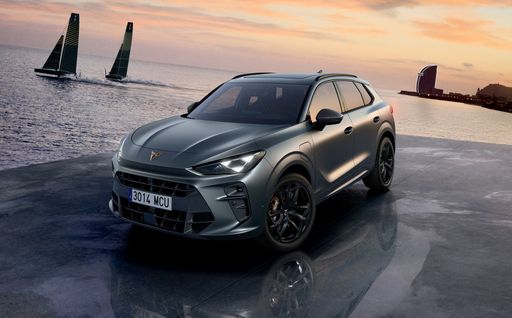
CUPRA Terramar
CUPRA Terramar
The CUPRA Terramar is a sharply styled, sporty SUV that brings athletic handling and bold design to buyers who want performance with everyday usability. Inside, premium finishes meet driver-focused flair and family-friendly practicality, making it a tempting pick for anyone who wants thrills without turning their daily routine into a chore.
details
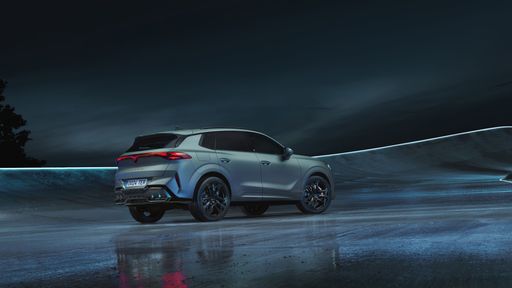
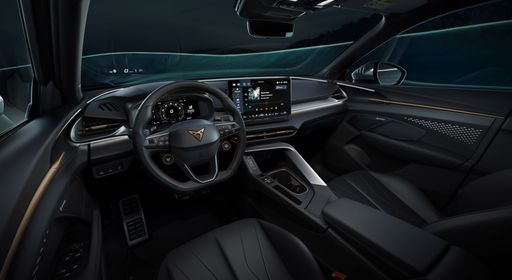
Skoda Karoq
The Skoda Karoq is a smart, unfussy compact SUV that blends roomy practicality with a pleasantly composed driving character. It won’t turn heads at a car meet, but it will make daily life easier with clever storage, sensible ergonomics and a reassuringly grown-up ride.
details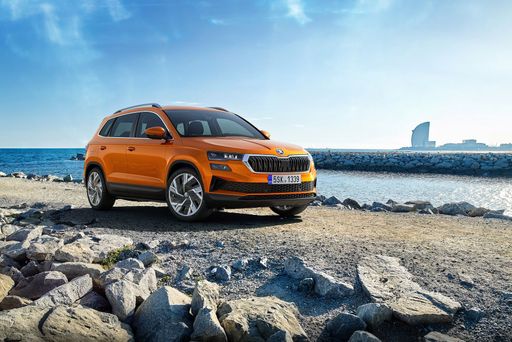
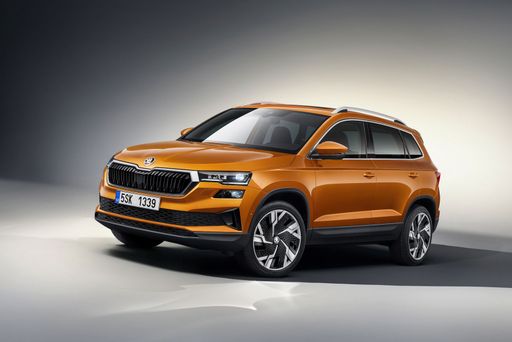
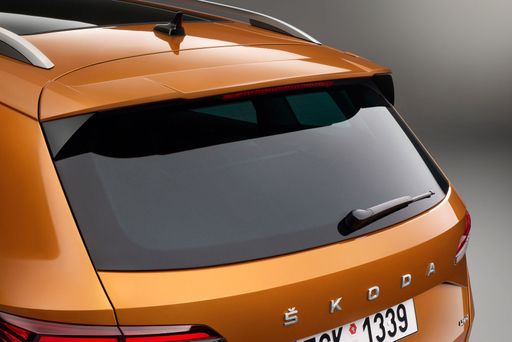
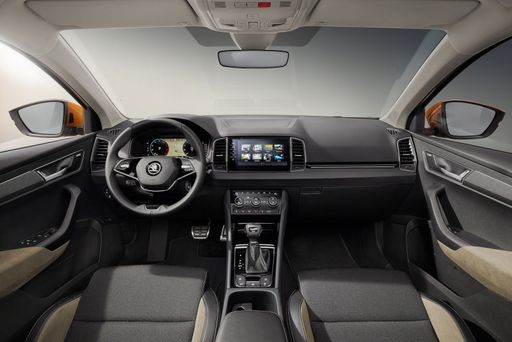
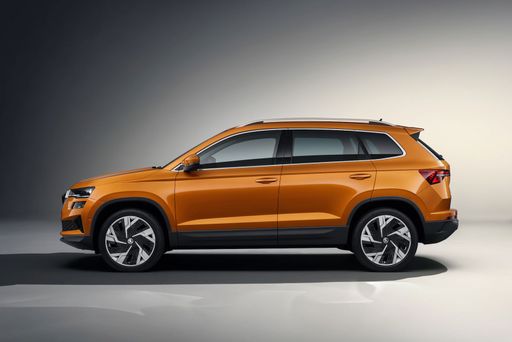
Costs and Consumption |
|
|---|---|
|
Price
36900 - 50600 £
|
Price
29100 - 41700 £
|
|
Consumption L/100km
1.6 - 8.4 L
|
Consumption L/100km
4.9 - 7.6 L
|
|
Consumption kWh/100km
-
|
Consumption kWh/100km
-
|
|
Electric Range
118 km
|
Electric Range
-
|
|
Battery Capacity
-
|
Battery Capacity
-
|
|
co2
36 - 191 g/km
|
co2
128 - 173 g/km
|
|
Fuel tank capacity
55 - 60 L
|
Fuel tank capacity
50 - 55 L
|
Dimensions and Body |
|
|---|---|
|
Body Type
SUV
|
Body Type
SUV
|
|
Seats
5
|
Seats
5
|
|
Doors
5
|
Doors
5
|
|
Curb weight
1638 - 1904 kg
|
Curb weight
1380 - 1655 kg
|
|
Trunk capacity
450 - 540 L
|
Trunk capacity
521 L
|
|
Length
4519 mm
|
Length
4384 - 4390 mm
|
|
Width
1869 mm
|
Width
1841 mm
|
|
Height
1586 mm
|
Height
1624 - 1629 mm
|
|
Max trunk capacity
-
|
Max trunk capacity
1630 L
|
|
Payload
512 - 542 kg
|
Payload
456 - 549 kg
|
Engine and Performance |
|
|---|---|
|
Engine Type
Petrol MHEV, Petrol, Plugin Hybrid
|
Engine Type
Petrol, Diesel
|
|
Transmission
Automatic
|
Transmission
Manuel, Automatic
|
|
Transmission Detail
Dual-Clutch Automatic
|
Transmission Detail
Manual Gearbox, Dual-Clutch Automatic
|
|
Drive Type
Front-Wheel Drive, All-Wheel Drive
|
Drive Type
Front-Wheel Drive, All-Wheel Drive
|
|
Power HP
150 - 272 HP
|
Power HP
115 - 190 HP
|
|
Acceleration 0-100km/h
5.9 - 9.3 s
|
Acceleration 0-100km/h
7 - 11.2 s
|
|
Max Speed
205 - 243 km/h
|
Max Speed
192 - 221 km/h
|
|
Torque
250 - 400 Nm
|
Torque
200 - 360 Nm
|
|
Number of Cylinders
4
|
Number of Cylinders
3 - 4
|
|
Power kW
110 - 200 kW
|
Power kW
85 - 140 kW
|
|
Engine capacity
1498 - 1984 cm3
|
Engine capacity
999 - 1984 cm3
|
General |
|
|---|---|
|
Model Year
2024 - 2025
|
Model Year
2025
|
|
CO2 Efficiency Class
E, G, F, B
|
CO2 Efficiency Class
D, E, F
|
|
Brand
CUPRA
|
Brand
Skoda
|
What drivetrain options does the CUPRA Terramar have?
The CUPRA Terramar is available as Front-Wheel Drive or All-Wheel Drive.
